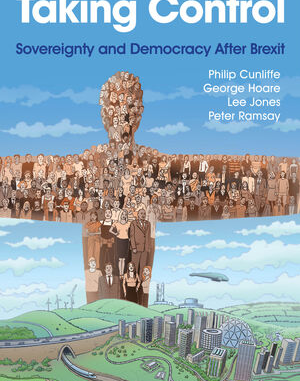
Book Review by Mathew D. Rose
We shall soon be marking the seventh anniversary of the Brexit Referendum of 23 June 2016. The four authors of this book were part of the Full Brexit collective that presented arguments for the Yes Vote from a critical and radical perspective. In this work they analyse why Brexit has not restored national sovereignty and democracy in Britain – better known as “Taking back control” – as envisioned by Brexit voters.
The most difficult aspect of understanding Brexit is the simple fact that neither camp, Remain and Leave, comprehended the EU. They still don’t, nor do they really care. Brexit was basically a class conflict, whereby a majority of the electorate – mainly of the working-class, which has suffered most from EU neo-liberalism rejected its own politicians, corporate interests, and the professional-managerial elites in a cri de coeur for a return to democracy in their nation state.
As the authors point out:
“With the sole exception of UKIP, every major political party – and 75 per cent of parliamentarians – had campaigned to Remain. They had been backed by big business, the Treasury, the Bank of England, all the universities, 99 per cent of academics, retired military and spy chiefs, the International Monetary Fund, and the president of the United States, to name but a few.”
In other words, the elite.
While Remainers claim these are the experts, critics would label them as the Phalanx of Liberal Authoritarianism. The question of expertise became painfully obvious as the predictions by a cohort of prominent economists predicting the collapse of the British economy should Leave succeed, known as “Project Doom”, have not materialised. So much for “scientifically objective” academics. In this book the authors have systematically debunked claims and press campaigns by the Remain and Leave proponents.
What is surprising is how few people had seen Brexit coming. Britain’s ancient democracy is based upon Parliament as the representative of the people and the sovereignty of Parliament, which is the antithesis of EU non-democracy. This basis of British democracy was jettisoned when Britain joined the EU. Like other EU members the UK transformed from a nation-state to member-state.
“The EU is the most anti-democratic system in the western world. It deprives hundreds of millions of people of meaningful democratic representation in what was once the global bastion of democracy.”
This was exactly the reason for Britain’s political oligarchy leading their nation into EU membership according to the authors. It was a “mechanism developed by national elites through which to rule their societies in a post-democratic era”.
Not only did the EU de-democratise Europe, just as importantly it cemented neo-liberalism as the foundation of its economic system. The Tories (including Mrs. Thatcher), Labour, and Liberal Democrats all supported joining the EU. It was “not an external imposition, but rather the expression of an internal transformation”.
Member-statehood permits the ruling elite to avoid transparency in government while allowing them to decline all responsibility for EU policies. This is not only true of the EU, but the IMF, World Bank, NATO, and so many other technocratic transnational organisations void of any democratic control.
As decision making was moved to a non-transparent, undemocratic, authoritarian EU in Brussels, national political structures in Britain withered, be it the political parties, the civil service, unions, and other democratic forums. Nor has the projected European demos arisen. As the authors point out, since 1990 voter participation in EU parliamentary elections has only once exceeded fifty percent. Instead we have a governing class free of democratic legitimacy and local identikit political parties competing to be “the most efficient administrator of the EU neo-liberal status quo”.
Britain’s political elite was suddenly confronted with a Brexit mandate it did not and does not want, and has no idea what it means and how to realise it: the re-establishment of Britain as a democratic nation-state versus the anti-democratic EU member-state it was. Up to now “Brexit is the first time that a popular revolt against the EU’s transnational constitutionalism has been sustained against subsequent elite reaction”, despite attempts by the Liberal Democrat, Labour, and Green parties to reverse the referendum result.
Nor do the British establishment parties know how to fill the democratic and administrative void they had created via EU membership, or realise the demand of the popular revolt to take back control. What we are seeing in Britain is a floundering as the political class tries to square the circle. The Tories in the meantime are trying to figure out how to get Brexit done without doing Brexit. The mentality of authoritarian liberalism that had reigned during EU membership of a political minority imposing its will on the majority is deeply embedded in British political culture.
As the authors point out, the Tory’s Brexit policy is the opposite of what the electorate voted for. Phrases like “No deal is better than a bad deal” were just bluff and the EU enjoyed calling all the Tory bluffs. The botched withdrawal negotiations should have come as no surprise.
Many Tories are of the opinion that Brexit means a re-establishment of Thatcherism – capitalism unchained, – with more deregulation, privatisation, and globalisation. As the authors explain, populism is criticism without policy and even the Brexiteers of the Tory party have no plan for the electorate taking back control. Just the opposite.
For the authors Britain “is less a revived nation-state than a post-member-state”. So what does taking back control entail? The authors dedicate a complete chapter to presenting their policies in great detail. These are based on three contradictions in the British state “revealed by Brexit”.
The first is the repudiation of subordination to supranational governance. This would entail leaving many further transnational organisation so that the British political class would be forced to concentrate on democratic representation at home. This includes leaving NATO and giving up the rest of Britain’s territorial imperial past.
The second contradiction is redefining and consolidating Britain geographically. This means ending the union with Northern Ireland and supporting its reunification with Ireland. This also embraces the reversal of devolution for Scotland and Wales, instead reforging a national political consensus.
The third and “most important contradiction” is “the reassertion of Parliament’s legal sovereignty”. Britain’s democracy has been eroded by a political oligarchy, whose goal is to rule over the political void they have created free of checks, balances, and the rule of law. Restoring this lost democracy means “breaking up” the established political oligarchy (“Today, we have a Conservative Party that does not conserve, a Labour Party that does not represent workers, and a Liberal Democrat Party that believes neither in liberty of democracy”). Some of the measures envisioned are finally introducing proportional representation, which would break the cartel of the established parties; ending the financing of political parties by corporate interests; permitting the recall of MPs on political. grounds; abolishing the House of Lords, increasing the number of parliamentarians to provide a broader representation of the electorate; and, the repeal of all laws limiting political expression among others.
It has been interesting to follow the post-referendum dispute regarding Brexit. All the current problems of the UK, which are no surprise when a nation is led by a political party that is defined by neo-liberalism, personal greed, incompetence, and corruption, are being blamed on Brexit, not on the simple fact that the government is run by the same failed political class that supported EU membership. In fact, many Remainers are enjoying a bloody good romp under Brexit as their wealth accumulation makes obscene increases. Nor do the other major parties – Labour and Liberal Democrats – offer any alternative political policies that would lead to a return to democracy and national sovereignty, just the same neo-liberal dictate that caused Brexit.
Britain has left the EU, much to the honour of the British electorate. Now they will have to secure democracy and sovereignty against the interests of their own elite.
Taking Control – Sovereignty and Democracy After Brexit by Philip Cunliffe, George Hoare, Lee Jones, Peter Ramsay
Publisher: Polity
ISBN-13: 978-1509553204



Well, even before the Brexit vote, it was painfully obvious that to Brexit would only be the start of taking back control. This I stated unequivocally time and again in my comments in The Guardian, which nobody took any notice of. But then, I’m not an academic. It does help to be an academic when stating the obvious, such as; invading another country is wrong. Attack through invading another country is not a justified action or defence of your country, unless you’ve been invaded. Even iin the case of Brexit, attack in itself is not the best defence. Taking back control is a complicated issue, because if you want to take back control, that means you have lost it- You ain’t got no control, sport. Democracy means taking part, else you lose it. Taking part means participating, not just voting for tweedledumb or tweedledee, Labour-LibDem or Tories. Participatory democracy is now a must. The kindergarten state of democracy is over.
On the day after the referendum Jeremy Corbyn’s position was that Article 50 should be enacted without delay. This was the right thing to say and it was what should’ve happened. The debate should have been about what to do with the greater freedom to choose economic policies rather than whether to enact Brexit at all or to do it ‘softly’. Brexit became seen as an end in itself rather than something that didn’t imply a policy direction by itself. The book is right to call out both europhiles who mischaracterise the EU as a benign internationalist organisation and neoliberal eurosceptics who wouldn’t come to terms with the real nature of the country’s needs and wishes.